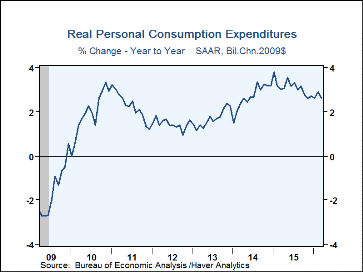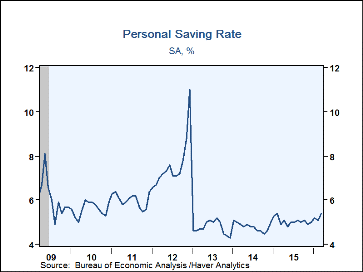 Global| Apr 29 2016
Global| Apr 29 2016U.S. Personal Income Growth Outpaces Spending
by:Tom Moeller
|in:Economy in Brief
Summary
A firmer job market is lending strength to earnings power. Personal income increased 0.4% during March (4.2% y/y) following a 0.1% uptick in February, revised from 0.2%. A 0.3% increase had been expected in the Action Economics [...]
A firmer job market is lending strength to earnings power. Personal income increased 0.4% during March (4.2% y/y) following a 0.1% uptick in February, revised from 0.2%. A 0.3% increase had been expected in the Action Economics Forecast Survey. Wages & salaries increased 0.4% (4.7% y/y) following a 0.1% slip. In other income categories, rental income strengthened 0.8% (7.7% y/y), but proprietors income remained unchanged (3.5% y/y). Transfer payments increased 0.3% (3.7% y/y) as Medicare receipts rose 0.5% (5.3% y/y). Social security payments eased slightly (+2.5% y/y). Unemployment insurance payments declined 1.5% (-7.2% y/y).
Disposable personal income increased 0.4% (4.0% y/y) following February's 0.1% rise. Adjusted for price increases, take-home pay rose 0.3% (3.1% y/y) following 0.2% increases in the prior two months.
Personal consumption expenditures during March increased a minimal 0.1% (3.5% y/y) following two months of 0.2% gain. February's rise was revised from 0.1%. The latest increase fell short of expectations for a 0.2% rise. Spending on durable goods declined 0.6% (+1.3% y/y), leaving Q1 growth at -2.7% (AR). Motor vehicle & parts purchases fell 2.0% (-4.8% y/y), down for the fourth consecutive month. Spending on furniture & appliances offset this decline with a 0.4% rise (3.1% y/y), while recreational goods & vehicles purchases rose 0.2% (6.1% y/y). Nondurable goods spending advanced 0.6% (0.4% y/y), but quarterly purchases declined 4.7% (AR). Clothing & footwear buying declined 0.5% (+0.3% y/y), but gasoline purchases increased 4.5% with higher prices (-17.6% y/y). Food & beverage purchases rose 0.4% (1.0% y/y). In the services area, outlays rose 0.1% (4.8% y/y), the gain held back by a 0.4% decline (+2.8% y/y) in spending on housing & utilities. Health care outlays rose 0.4% (4.5% y/y) while recreation buying gained 0.3% (8.8% y/y). Spending at restaurants & hotels fell 0.6% (+5.5% y/y).
Adjusted for price inflation, personal consumption expenditures remained constant m/m (2.6% y/y) after a 0.3% increase. During Q1, spending rose at a 1.9% annual rate, the weakest rise in a year.
The personal savings rate held steady at 5.4%, but February's rate was lessened to 5.1%. January's rate also was revised down to 5.2%. The Q1 savings rate of 5.2% equaled the level in Q1'15. The level of personal savings rose 12.7% y/y in March.
The chain-type price index rose 0.1%, and the y/y increase of 0.8% compared to a 0.3% rise during all of last year. The price index excluding food & energy also nudged 0.1% higher (1.6% y/y). The service price index gained 0.2% (2.1% y/y). The durable goods index declined 0.3% (-1.6%) while the nondurables price index eased 0.1% (-1.9% y/y).
The personal income & consumption figures are available in Haver's USECON database with detail in the USNA database. The Action Economics figure is in the AS1REPNA database.
A Discussion of Key Secular Trends, Economic Conditions and Monetary Policy by Robert S. Kaplan, President & CEO, Federal Reserve Bank of Dallas is available here.
| Personal Income & Outlays (%) | Mar | Feb | Jan | Mar Y/Y | 2015 | 2014 | 2013 |
|---|---|---|---|---|---|---|---|
| Personal Income | 0.4 | 0.1 | 0.4 | 4.2 | 4.4 | 4.4 | 1.1 |
| Wages & Salaries | 0.4 | -0.1 | 0.6 | 4.7 | 4.6 | 5.1 | 2.7 |
| Disposable Personal Income | 0.4 | 0.1 | 0.4 | 4.0 | 3.7 | 4.2 | -0.1 |
| Personal Consumption Expenditures | 0.1 | 0.2 | 0.2 | 3.5 | 3.4 | 4.2 | 3.1 |
| Personal Saving Rate | 5.4 | 5.1 | 5.2 | 4.9 (Mar. '15) |
5.0 | 4.8 | 4.8 |
| PCE Chain Price Index | 0.1 | -0.1 | 0.1 | 0.8 | 0.3 | 1.4 | 1.4 |
| Less Food & Energy | 0.1 | 0.2 | 0.3 | 1.6 | 1.3 | 1.5 | 1.5 |
| Real Disposable Income | 0.3 | 0.2 | 0.2 | 3.1 | 3.4 | 2.7 | -1.4 |
| Real Personal Consumption Expenditures | 0.0 | 0.3 | 0.0 | 2.6 | 3.1 | 2.7 | 1.7 |
Tom Moeller
AuthorMore in Author Profile »Prior to joining Haver Analytics in 2000, Mr. Moeller worked as the Economist at Chancellor Capital Management from 1985 to 1999. There, he developed comprehensive economic forecasts and interpreted economic data for equity and fixed income portfolio managers. Also at Chancellor, Mr. Moeller worked as an equity analyst and was responsible for researching and rating companies in the economically sensitive automobile and housing industries for investment in Chancellor’s equity portfolio. Prior to joining Chancellor, Mr. Moeller was an Economist at Citibank from 1979 to 1984. He also analyzed pricing behavior in the metals industry for the Council on Wage and Price Stability in Washington, D.C. In 1999, Mr. Moeller received the award for most accurate forecast from the Forecasters' Club of New York. From 1990 to 1992 he was President of the New York Association for Business Economists. Mr. Moeller earned an M.B.A. in Finance from Fordham University, where he graduated in 1987. He holds a Bachelor of Arts in Economics from George Washington University.
More Economy in Brief
 Global| Feb 05 2026
Global| Feb 05 2026Charts of the Week: Balanced Policy, Resilient Data and AI Narratives
by:Andrew Cates










